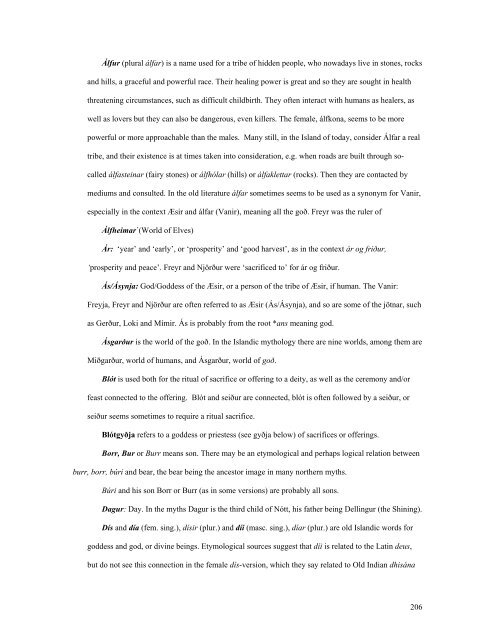Create successful ePaper yourself
Turn your PDF publications into a flip-book with our unique Google optimized e-Paper software.
Álfur (plural álfar) is a name used for a tribe <strong>of</strong> hidden people, who nowadays live in stones, rocks<br />
<strong>and</strong> hills, a graceful <strong>and</strong> powerful race. <strong>The</strong>ir healing power is great <strong>and</strong> so they are sought in health<br />
threatening circumstances, such as difficult childbirth. <strong>The</strong>y <strong>of</strong>ten interact with humans as healers, as<br />
well as lovers but they can also be dangerous, even killers. <strong>The</strong> female, álfkona, seems to be more<br />
powerful or more approachable than the males. Many still, in the Isl<strong>and</strong> <strong>of</strong> today, consider Álfar a real<br />
tribe, <strong>and</strong> their existence is at times taken into consideration, e.g. when roads are built through so-<br />
called álfasteinar (fairy stones) or álfhólar (hills) or álfaklettar (rocks). <strong>The</strong>n they are contacted by<br />
mediums <strong>and</strong> consulted. In the old literature álfar sometimes seems to be used as a synonym for Vanir,<br />
especially in the context Æsir <strong>and</strong> álfar (Vanir), meaning all the goð. Freyr was the ruler <strong>of</strong><br />
Álfheimar´(World <strong>of</strong> Elves)<br />
Ár: ‘year’ <strong>and</strong> ‘early’, or ‘prosperity’ <strong>and</strong> ‘good harvest’, as in the context ár og friður,<br />
‘prosperity <strong>and</strong> peace’. Freyr <strong>and</strong> Njörður were ‘sacrificed to’ for ár og friður.<br />
Ás/Ásynja: God/Goddess <strong>of</strong> the Æsir, or a person <strong>of</strong> the tribe <strong>of</strong> Æsir, if human. <strong>The</strong> Vanir:<br />
Freyja, Freyr <strong>and</strong> Njörður are <strong>of</strong>ten referred to as Æsir (Ás/Ásynja), <strong>and</strong> so are some <strong>of</strong> the jötnar, such<br />
as Gerður, Loki <strong>and</strong> Mímir. Ás is probably from the root *ans meaning god.<br />
Ásgarður is the world <strong>of</strong> the goð. In the Isl<strong>and</strong>ic mythology there are nine worlds, among them are<br />
Miðgarður, world <strong>of</strong> humans, <strong>and</strong> Ásgarður, world <strong>of</strong> goð.<br />
Blót is used both for the ritual <strong>of</strong> sacrifice or <strong>of</strong>fering to a deity, as well as the ceremony <strong>and</strong>/or<br />
feast connected to the <strong>of</strong>fering. Blót <strong>and</strong> seiður are connected, blót is <strong>of</strong>ten followed by a seiður, or<br />
seiður seems sometimes to require a ritual sacrifice.<br />
Blótgyðja refers to a goddess or priestess (see gyðja below) <strong>of</strong> sacrifices or <strong>of</strong>ferings.<br />
Borr, Bur or Burr means son. <strong>The</strong>re may be an etymological <strong>and</strong> perhaps logical relation between<br />
burr, borr, búri <strong>and</strong> bear, the bear being the ancestor image in many northern myths.<br />
Búri <strong>and</strong> his son Borr or Burr (as in some versions) are probably all sons.<br />
Dagur: Day. In the myths Dagur is the third child <strong>of</strong> Nótt, his father being Dellingur (the Shining).<br />
Dís <strong>and</strong> día (fem. sing.), dísir (plur.) <strong>and</strong> díi (masc. sing.), díar (plur.) are old Isl<strong>and</strong>ic words for<br />
goddess <strong>and</strong> god, or divine beings. Etymological sources suggest that díi is related to the Latin deus,<br />
but do not see this connection in the female dís-version, which they say related to Old Indian dhisána<br />
206


